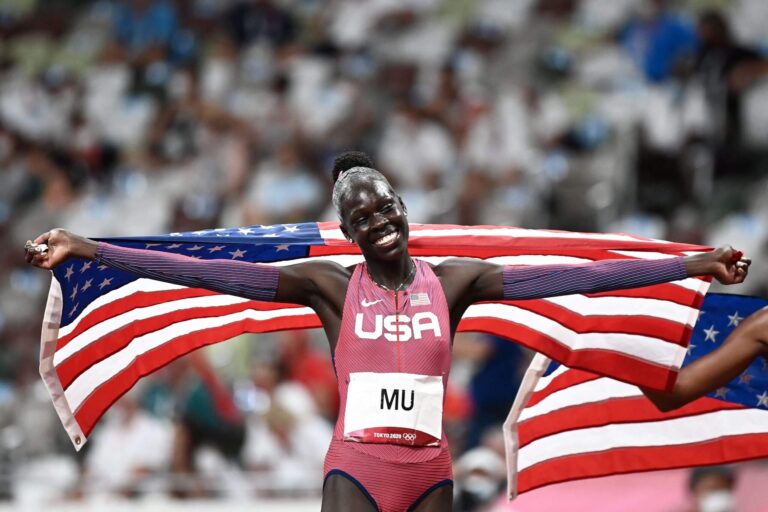The latest dent in the NCAA’s bedrock principle of amateurism came from an unlikely place: Monaco.
Track and field gold medalists will become the first athletes to earn global prize money at the Olympics, the sport’s international governing body said Wednesday. Each gold medalist will receive $50,000 for individual wins. World Athletics, which manages track and field from its headquarters in Monaco, has also pledged to award prize money to silver and bronze medalists at the Los Angeles Olympics in 2028.
“It is important that we start somewhere and ensure that some of the revenue raised by our athletes at the Olympic Games goes directly back to the people who make these Games a global spectacle,” World Athletics president Sebastian Coe said in a statement.
What is not yet clear is whether current college athletes are allowed to receive prize money. In what feels like a relic of college sports’ bygone past, the NCAA currently bars athletes from receiving prize money at events like the US Open in tennis or golf. The NCAA did not immediately respond to a request for comment on World Athletics’ announcement.
Although the NCAA allows money to be paid to college Olympic athletes under its Operation Gold program, that rule clearly states that the money must come from the governing body of the sport for the athlete’s sport in his or her home country. . They may receive money paid by their national governing body as well as the US Olympic and Paralympic Committee; the USOPC currently awards $37,500 for each gold medalist, $22,500 for each silver medalist and $15,000 for each bronze medalist.
In a very specific environment, college athletes can get paid to play their sport — and they can maintain their NCAA eligibility. In essentially any other environment, they cannot.
It’s past time for the NCAA to allow its athletes to accept their hard-earned prize money, regardless of what its governing body hands out. That should include World Athletics, which pays its prize money from revenue it receives from the International Olympic Committee. It should also include individual professional sports organizations such as the USTA or USGA, which would allow college tennis and golf players to earn prize money while maintaining college eligibility.
Such incidents are at the heart of a lawsuit filed by University of North Carolina tennis player Reese Brantmeier, who argues that he and other athletes like him deserve to keep the prize money they earn. earn by participating and winning contests. Right now, they can only save enough to cover their expenses.
Meanwhile … these athletes see Caitlin Clark appearing in national television commercials and quarterbacks trading headphones through name, image and likeness (NIL) deals while maintaining their identity qualified to the NCAA.
“I can’t think of any other situation where an organization can have a draconian quid pro quo where you’re prohibited from receiving money you’ve earned with your own sweat,” UNC associate head tennis coach Tyler Thomson said. The Athletic last month when Brantmeier filed his lawsuit. “I just think it’s really wrong, and especially at the age of NIL.”
That point is even more acute in the NIL age marked by pseudo-salaries paid by booster-supported collectives. Those NIL deals effectively allow donors to pay athletes to play at a particular school — a no-nonsense solution to a status quo where schools and conferences can’t pay athletes directly. The argument that a tennis player receiving prize money is too closely tied to pay-for-play holds less water when you compare it to what happens in sports like football and men’s basketball.

UNC tennis player Reese Brantmeier is suing the NCAA for not allowing college athletes to accept prize money and maintain their eligibility. (Preston Mack/NCAA Photos via Getty Images)
The current system may not be what it is for much longer anyway, as a laundry list of lawsuits continues to chip away at the NCAA’s longstanding legal arguments in defense of its version of amateurism. In the meantime, the organization and all of college athletics are stuck in a kind of gray area, as rules that may have made sense in the past exist unchallenged until the spotlight shines brightly on them.
That light exposed the hypocritical stance of the NCAA on prize money. This is blindingly obvious against the backdrop of million-dollar NIL deals and recruiting inducements-that-shouldn’t-be-inducements. It is disheartening to think that the governing body of college sports could force tennis players to turn pro instead of allowing them to attend classes and compete in college while receiving prize money in various events. Or the NCAA could bar a collegiate sprinter who beats the world’s fastest from receiving money from World Athletics simply because he doesn’t run in the USOPC.
All these draconian rules do is push elite athletes off campus sooner than they would like. That’s not what the NCAA should be doing, intentionally or not.
So, here is an opportunity to right a wrong. Here is an opportunity for a common-sense win in the midst of several defeats in court. Let college athletes keep their prize money — and their eligibility, too.
(Top photo of Athing Mu, who left Texas A&M to turn pro ahead of the 2021 US Olympic Track and Field Trials, celebrating her gold medal in the women’s 800-meter at the Tokyo Olympics: Jewel Samad / AFP via Getty Images)
